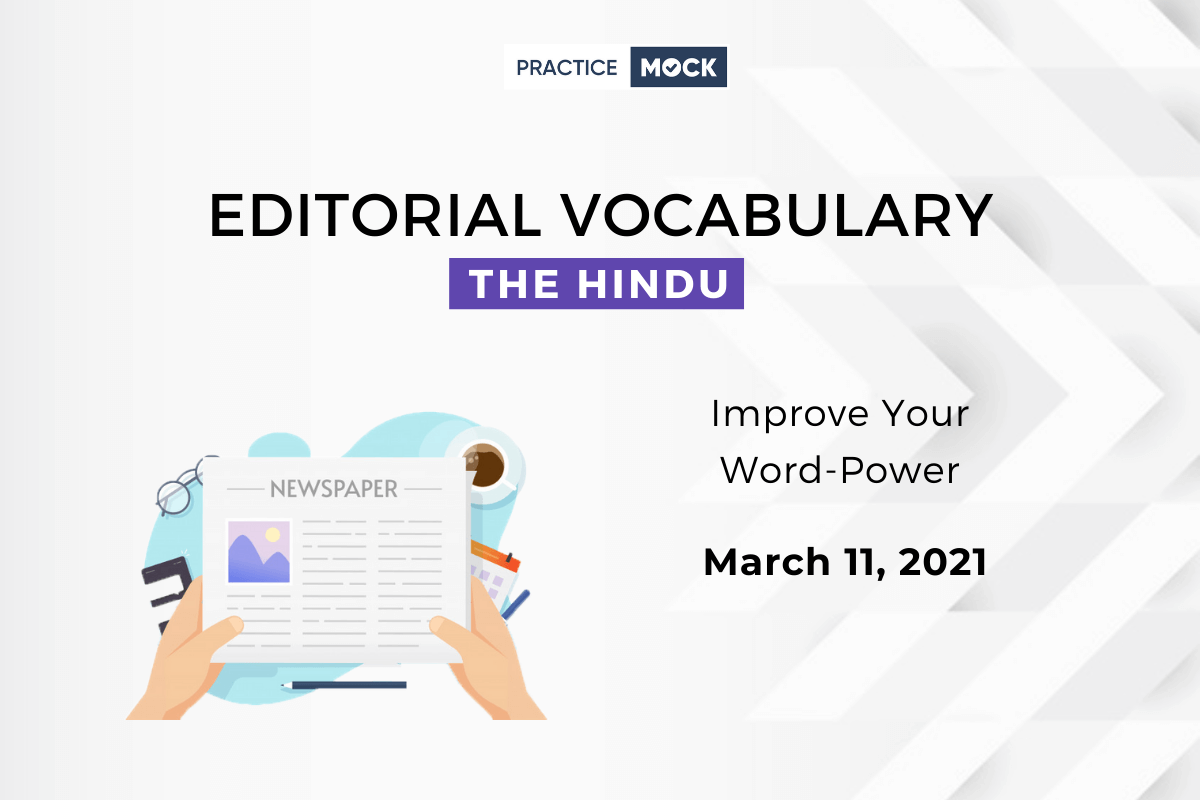Today’s Hindu editorial talks about “REGULATION REDUX: ON SUPREME COURT QUERY ON AN ENVIRONMENT WATCHDOG”. We have picked and chosen difficult words along with their meanings. Give it a read and learn these words to enhance your vocabulary.
Difficult Words & their Meanings
| Difficult Word/Phrase | Contextual Meaning |
| successive | happening one after the other without any break |
| consensus | a generally accepted opinion or decision |
| disguise | to hide an opinion, a feeling, etc |
| scrutiny | the careful and detailed examination of something |
| critiqued | a report of something that examines it and provides a judgment, especially negative |
| proponent | a person who supports an idea or a plan |
| rebuffed | to refuse to accept a suggestion |
| dubious | doubtful |
| biodiversity | the number and types of plants and animals that exist in a particular area |
Regulation redux: On Supreme Court query on an environment watchdog
An environmental regulator can work only if governments see the value of nature
The Supreme Court’s notice to the Centre on a public interest plea to set up a national environmental regulator under the Environment (Protection) Act, 1986 revives an issue that successive (happening one after the other without any break) governments have preferred to ignore, in spite of specific orders passed by the same court more than nine years ago. There is no consensus (a generally accepted opinion or decision) on what a new regulator can achieve, since official policy privileges ease of doing business. The draft Environmental Impact Assessment (EIA) Notification 2020, which seeks to advance that goal, makes no effort to disguise (to hide an opinion, a feeling, etc) the desire to virtually eliminate civil society’s role. It does not encourage the public to voice its views and report violations, while independent scrutiny (the careful and detailed examination of something) of proposals is weakened. In fact, the EIA process, especially after the notification in 2006, has been heavily critiqued (a report of something that examines it and provides a judgment, especially negative) for conflicts of interest – the proponent (a person who supports an idea or a plan) of a project is responsible for producing the EIA report — while clearances under forest, wildlife, air and water quality laws are heavily weighted in favour of promoters. Rather than reform the system, in 2011 and 2014, the Centre rebuffed (to refuse to accept a suggestion) the apex court on the question of forming an independent regulator, contending that its orders in the Lafarge mining case were only in the nature of a suggestion, and later sought time but decided not to act. The current PIL is forcing the government to come up with a fresh explanation on why it has been sitting on its hands all along. Yet, for a national regulator to work, the government must recognize the limits to extractive growth, respect a neutral body and preserve the integrity of the environment.
A key issue raised by the PIL is the lack of credibility of the EIA process, leading to reports that are often produced with the help of dubious (doubtful) expertise and manipulated data. In most cases, the proponents also ignore the views of communities that would be displaced, and are ill-equipped to assess the loss of biodiversity (the number and types of plants and animals that exist in a particular area) and ecosystem services such as clean air, water and farm productivity. The Centre and States must acknowledge the conflict arising from pressure on scarce land and ecosystems from polluting projects, which has already created clusters of industrial locations that are doing badly on the CPCB’s Comprehensive Environmental Pollution Index. It is striking that this did not stop approvals for further polluting activity in some of these places, such as large coal-based power plants cleared in recent years in Kanpur, Cuddalore, and Angul in Odisha. What should concern the Centre is the laggardly pace at which multiple departments process project proposals, raising transaction costs and resulting in the clamour to dispense with regulation. The remedies lie in administrative reform. It is eminently feasible, for instance, to produce a whitelist of lands for industry, reclaiming polluted areas. What India cannot afford to do is further degrade its forests, rivers, wetlands and air, whose health is vital for its large population.
Read The Hindu Editorial Vocabulary– March 10, 2021.
- Sign Up on Practicemock for Updated Current Affairs, Free Topic Tests and Free Mini Mocks
- Sign Up Here to Download Free Study Material
Free Mock Tests for the Upcoming Exams
- RRB PO 2024 Free Mock Test
- RRB Clerk 2024 Free Mock Test
- SSC MTS Free Mock Test
- SSC CHSL Free Mock Test
- SSC CGL Free Mock Test
- GATE Mechanical Free Mock Test
- GATE Civil Free Mock Test
- NABARD Gr. A Free Mock Test
- SBI Clerk Mains Free Mock Test
- SSC CPO Free Mock Test
- AFCAT Free Mock Test
- CAT Free Mock Test
- NIACL Assistant Free Mock Test
- UIIC AO Free Mock Test
- UIIC Assistant Free Mock Test
- GIC Assistant Manager Free Mock Test
- NICL AO Free Mock Test
- Free SSC Live Test
- UPSC CSAT Free Mock Test
- CDS-I Free Mock Test
- RRB ALP Free Mock Test


